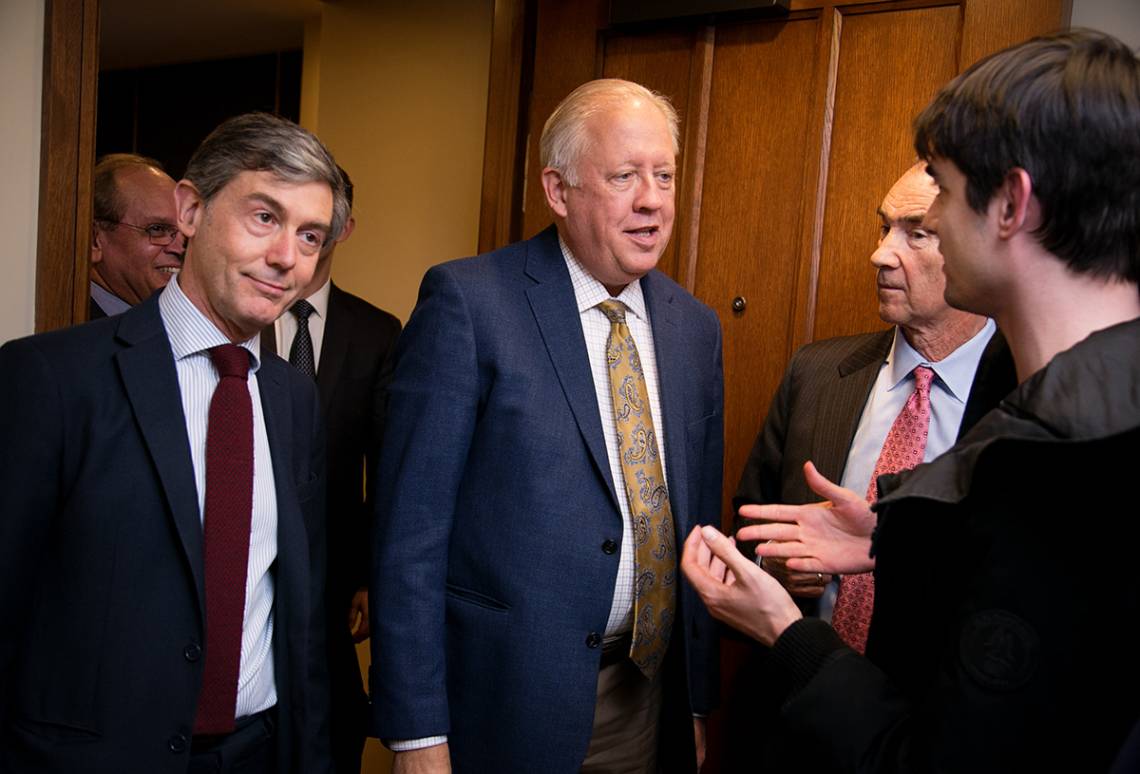A Top Career Diplomat, on His Way Out, Tells America to 'Buckle Up'
Thomas Shannon discusses diplomatic challenges and a changing American political scene

Global trade has expanded for several decades yet wages are stagnant and inequality is growing.
The United States and its allies have fought terrorism for two decades but the world is less safe.
These were among the perplexities of governing and diplomacy shared Thursday by Thomas Shannon Jr., the State Department’s top career diplomat who served under six presidents.
Despite providing a long list of challenges facing American foreign policy and the US Department of State, Shannon sounded optimistic.
“We are in a period of great political effervescence, and we are in the midst political change that I believe will transform our political parties” and institutions, he said. “This will be done from the grassroots up and will be done through elections and will be done through other parts of our political life.
“I think at the end of the day we will come out this a stronger democracy” that involves more Americans, Shannon said.
The talk came the day after Shannon announced his retirement for personal, not political, reasons. He has told reporters that the death of his mother last November and turning 60 last week convinced him it was time to make a change.
“While I’ve been blessed in many ways, one thing I don’t have a lot of is time,” he told the Duke audience.
Shannon plans to remain as undersecretary of state for political affairs until a replacement is found and confirmed.
During the hour-and-a-half event at the Rubenstein Library, Shannon laid out “drivers and consequences” of global change based on government reports from 2013 and 2017.
Among the drivers:
- The empowerment of individuals and the rise of the middle class around the world, which puts pressure on governments to respond to more people with a voice.
- An aging population. In the coming decade, people age 60 and older are going to be the fastest growing segment of the human race, impacting economies, resources and how countries relate to each other, he said. At the same time, ignoring the needs of youth who are “not content to sit back and feed the needs of the aging” could lead to a rise in gangs and global terrorist networks.
- A world in which the richest people are aging and the poorest are the young – a “real social deficit” that has to be addressed to avoid conflict.
- The unequal sharing of technology gains, which will further divide societies.
- Governments have been deferring major problems – on health care, education, environment, etc. -- and these issues will eventually demand a response that governments will be less capable of providing, Shannon said.
In resolving these and other issues, Shannon said that without statesmanship and the right kind of political leadership, people will fall back on their religious and ethnic identities that “will drive conflict through exclusion.”
A “simultaneous convergence of problems with an inability to solve them” is also looming, he said.
Asked about hotspots around the world, Shannon said the Syrian conflict will require a political solution, and while ISIS has been beaten back in Iraq and Syria, the terrorist group is expected to move away from its caliphate vision to insurgency.
Then there’s North Korea.
“The Korean peninsula is so pressing and so dramatic that they’re just absorbing an enormous amount of bandwidth right now,” he said.
Regarding U.S. foreign policy, he said the U.S. has to “prove our relevance to our partners.”
“It can’t just be about us, it has to be about them, too,” he said. “We have to have a degree of listening, which we haven’t been good at.”
He added that other nations want to know the United States can make and implement a decision. “If not they’re going to exploit that … (and) say ‘we can’t get too close to these people right now.’”
His talk, “Buckle Up: Global Foreign Policy Trends and American Diplomacy,” was part of a speaker series at Duke on the challenges of global governance funded by the Ambassador Dave and Kay Phillips Family International Lectureship.
The event was hosted by the Duke University Center for International and Global Studies, the Duke University Center for Latin American and Caribbean Studies and the Duke University Program in American Grand Strategy.